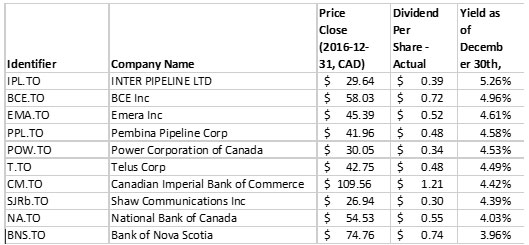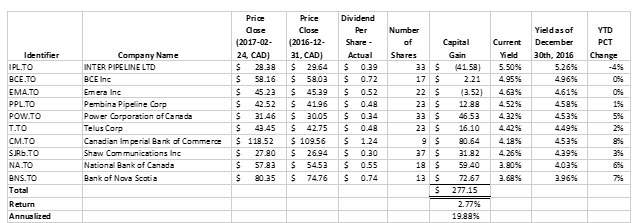By applying the popular ‘Dogs of the Dow’ strategy to the TSX 60, investors could see a historical outperformance by an average of about 25%
There is a popular investment strategy among passive investors that has the ability to provide strong returns while minimizing risk. Historically it has outperformed the index it’s matched against and is as simple as sorting you’re Excel sheet from highest dividend yield to lowest. Seems a little too good to be true right?
This strategy is known as the “Dogs of the Dow” and was first made popular by money manager Michael O’Higgins in 1991 in his book entitled “Beating the Dow.” Based on the Dow Jones Industry Average (DJIA), you organize the list of companies from highest yield to lowest, pick the Top 10 highest-yielding stocks, and invest in an equally-weighted portfolio for the year.
The theory behind the strategy is that these stocks have underperformed over the last year, resulting in the high dividend yield (dividend payout/price of stock). However, in the following year, these stocks should outperform relative to the other constituents in the index. As the yield decreases, this is a product of the stock price increasing so the investor not only gets the benefit of a high yield on their investment dollar, but also the benefits of the capital gain. At the end of the year the investor then reassesses the list, selling off the ‘dogs’ that have either been taken out of the index or have decreased their yield out of the Top 10, then restarts the process.
Application to the TSX
Between the years 1957 and 2003, when this strategy is applied to the DJIA it produces an average return of 14.3%, which is 3% higher than the Dow itself. Add in the impact of compounding over all of those years and the difference really starts to add up.
So how might this strategy translate into the Canadian marketplace and more specifically the TSX 60? Well in 1987 David Stanley demonstrated just that when he outlined his version entitled Beating the TSX (BTSX). Based on historical performance, this strategy provided an average annual return of 12.47% per year between 1987-2013, compared to 9.89% for the TSX 60 Index.
If you implemented this strategy on the TSX 60 this past December, you would have generated a list of stocks similar to what is outlined in Figure 1, below.
Figure 1: Dogs of the TSX December 31st, 2016

Source: Data curated from Thomson Reuters Eikon
Note: the dividend per share is the dividend from the last fiscal quarter, while the yield is that dividend, annualized, then divided by the closing price on December 31st, 2016
Had you invested $10,000 into the equally weighted index, your portfolio would look something like what is presented in Figure 2 below. As of Friday, February 24, 2017, that investment would have already returned a capital gain of $277.15, or 2.77%, before consideration for the dividends that may have been paid out as well. On an annualized basis that would be a return of 19.88% before dividends, on a 252-day trading year. Although the first 38 trading days aren’t indicative of performance for an entire year, it does help to shed some light on just how powerful this investment strategy can be.
Figure 2: Dogs of the TSX Current Performance

Note: Annualized formula =(1.0277^(252/38))-1
Note of Caution:
Although all of the companies in the TSX 60 are well established and this strategy is one that contains lower levels of risk, there still is the inherent risk of the market involved. This strategy may outperform on an average basis but may still, under certain circumstances, underperform compared to the return of the total index or other strategies. Another consideration to make before investing in this strategy is the prevailing market conditions at the time. Use judgement when selecting the stocks as certain industries may be heading into a downturn and even though they are high yielding, may experience larger capital losses.
Overall, people choose blue-chip stocks for the security of the dividend payout. Why shouldn’t you also be able to invest in that security while enhancing your returns through capital gains? I mean, even if you aren’t a dog lover but they bring you the paper, can you really be mad at them?
Disclaimer: The Content contained on this page (including any facts, views, opinions, recommendations, description of, or references to, products or securities) made available by SmallCapPower/Ubika Research is for information purposes only and is not tailored to the needs or circumstances of any particular person. Any mention of a particular security is merely a general discussion of the merits and risks associated there with and is not to be used or construed as an offer to sell, a solicitation of an offer to buy, or an endorsement, recommendation, or sponsorship of any entity or security by SmallCapPower/Ubika Research. The Reader should apply his/her own judgment in making any use of any Content, including, without limitation, the use of any information contained therein as the basis for any conclusions. The Reader bears responsibility for his/her own investment research and decisions. Before making any investment decision, it is strongly recommended that you seek outside advice from a qualified investment advisor.
SmallCapPower/Ubika Research does not provide or guarantee any financial, legal, tax, or accounting advice or advice regarding the suitability, profitability, or potential value of any particular investment, security, or information source. Ubika and/or its affiliates and/or their respective officers, directors or employees may from time to time acquire, hold or sell securities and/or commodities and/or commodity futures contracts in certain underlying companies mentioned in this site and which may also be clients of Ubika’s affiliates. In such instances, Ubika and/or its affiliates and/or their respective officers, directors or employees will use all reasonable efforts to avoid engaging in activities that would lead to conflicts of interest and Ubika and/or its affiliates will use all reasonable efforts to comply with conflicts of interest disclosures and regulations to minimize the conflict.
